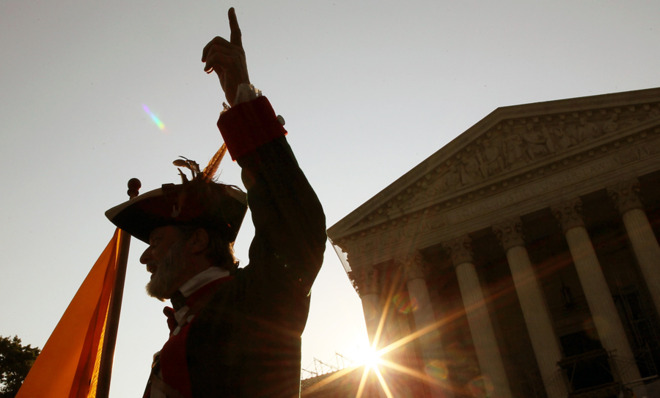The Tea Party is winning the war on corporate welfare
The GOP has long been the party of Big Business. That may be changing.


The political punditocracy just can't seem to settle on the conventional wisdom about the Tea Party.
Eric Cantor, a safe incumbent facing a gadfly challenger, loses his primary. The Tea Party reigns supreme! Then Thad Cochran, an endangered incumbent who trailed in the first round of balloting against an upstart challenger, wins his. The Tea Party is dead!
It really does seem like one week we get a series of articles proclaiming that the Tea Party is toast, and the very next week there are equally confident assurances that the Tea Partiers are ready to storm the Capitol, wielding flaming torches and pitchforks. Is it time to raise the drawbridge or conduct an autopsy?
The Week
Escape your echo chamber. Get the facts behind the news, plus analysis from multiple perspectives.

Sign up for The Week's Free Newsletters
From our morning news briefing to a weekly Good News Newsletter, get the best of The Week delivered directly to your inbox.
From our morning news briefing to a weekly Good News Newsletter, get the best of The Week delivered directly to your inbox.
The truth is, neither sweeping narrative is completely accurate. But they both tell part of the story.
Overall, this hasn't been a good year for conservative primary challengers. Yes, conservatives have won the Republican nomination for some open seats, like Nebraska GOP Senate candidate Ben Sasse. Similarly, Texas Republican Rep. Ralph Hall lost to a challenger with some Tea Party backing. But Hall had some Tea Party support himself, including an endorsement from former colleague Ron Paul.
Mississippi Tea Partier Chris McDaniel won a plurality of the vote in his primary challenge of the establishment's Thad Cochran, only to lose in the runoff.
Nevertheless, grassroots populist conservatives are forcing establishment Republicans to work hard or risk unexpected defeat. It may be nearly unprecedented for a sitting House majority leader to lose a primary, but there is ample precedent for the Tea Party knocking off GOP incumbents.
A free daily email with the biggest news stories of the day – and the best features from TheWeek.com
The Tea Party doesn't have to win every time. They just have to win often enough to have at least a marginal effect on Republican elected officials' behavior.
You can see that effect in the fight over defunding ObamaCare and the debt ceiling, but it's evident even in cases that cut against anti-Tea Party stereotypes. Consider the Tea Party push against reauthorizing the Export-Import Bank, an 80-year-old taxpayer-backed institution that helps big businesses export overseas.
Helping business — even if it involves a little largesse — is a quintessentially Republican thing to do. That's why many Republicans have supported the Export-Import Bank in the past. One such Republican is Kevin McCarthy, the man who replaced Cantor as majority leader.
Not anymore. Now McCarthy is letting reauthorization come up for a vote, and seems inclined to agree that Ex-Im's big business beneficiaries don't need the taxpayer help.
For a group of activists often portrayed as being in the pockets of corporate America and the Koch brothers, the Tea Party frequently lines up against the Chamber of Commerce and K Street in intraparty spats. And for a movement many liberals believe is inspired by white resentment against "inner-city" food-stamps users and an African-American president, high on the Tea Party's list of welfare queens are Boeing, General Motors, and General Electric.
Progressives have also decried the Export-Import Bank. Openly socialist Vermont Sen. Bernie Sanders once called it "corporate welfare at its worst." Shortly before becoming president, Barack Obama said it "has become little more than a fund for corporate welfare."
Tea Party critiques of crony capitalism and corporate welfare have now permeated the GOP. I was recently visited by a Republican congressional candidate. He was a nice guy with whom I agree on many issues. But listening to his talking points and reading his position papers, he said little that wouldn't have been out of place in Republican circles 20 years ago. It was almost as if he had been put in a time capsule back in 1994 and had recently emerged, still clutching his copy of the Contract with America.
With one exception: He pledged to eliminate corporate welfare. He didn't mention cutting more traditional welfare programs at all. There have always been some Republicans who have talked this way — John Kasich when he chaired the House Budget Committee in the 1990s, David Stockman when he was Ronald Reagan's budget director — but not your average GOP candidate.
One subtle shift the Tea Party has brought about is that Republicans are increasingly more interested in being pro-market, not just generically pro-business. Some, like victorious Cantor primary challenger Dave Brat, instinctively understand the differences. Others are still working on it.
But this anti-corporate welfare positioning would never have seeped into the mainstream GOP if Republicans like Mike Lee, Rand Paul, and even Marco Rubio didn't beat their establishment opponents.
The Tea Party is neither dead nor dominant. But it is slowly changing the Republican Party, one primary at a time.
W. James Antle III is the politics editor of the Washington Examiner, the former editor of The American Conservative, and author of Devouring Freedom: Can Big Government Ever Be Stopped?.
-
 Bari Weiss’ ‘60 Minutes’ scandal is about more than one report
Bari Weiss’ ‘60 Minutes’ scandal is about more than one reportIN THE SPOTLIGHT By blocking an approved segment on a controversial prison holding US deportees in El Salvador, the editor-in-chief of CBS News has become the main story
-
 Has Zohran Mamdani shown the Democrats how to win again?
Has Zohran Mamdani shown the Democrats how to win again?Today’s Big Question New York City mayoral election touted as victory for left-wing populists but moderate centrist wins elsewhere present more complex path for Democratic Party
-
 Millions turn out for anti-Trump ‘No Kings’ rallies
Millions turn out for anti-Trump ‘No Kings’ ralliesSpeed Read An estimated 7 million people participated, 2 million more than at the first ‘No Kings’ protest in June
-
 Ghislaine Maxwell: angling for a Trump pardon
Ghislaine Maxwell: angling for a Trump pardonTalking Point Convicted sex trafficker's testimony could shed new light on president's links to Jeffrey Epstein
-
 The last words and final moments of 40 presidents
The last words and final moments of 40 presidentsThe Explainer Some are eloquent quotes worthy of the holders of the highest office in the nation, and others... aren't
-
 The JFK files: the truth at last?
The JFK files: the truth at last?In The Spotlight More than 64,000 previously classified documents relating the 1963 assassination of John F. Kennedy have been released by the Trump administration
-
 'Seriously, not literally': how should the world take Donald Trump?
'Seriously, not literally': how should the world take Donald Trump?Today's big question White House rhetoric and reality look likely to become increasingly blurred
-
 Will Trump's 'madman' strategy pay off?
Will Trump's 'madman' strategy pay off?Today's Big Question Incoming US president likes to seem unpredictable but, this time round, world leaders could be wise to his playbook


